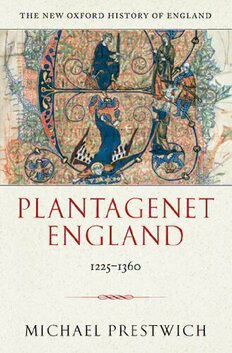
Plantagenet England, 1225-1360 PDF
Preview Plantagenet England, 1225-1360
THE NEW OXFORD HISTORY OF ENGLAND General Editor (cid:1) j. m. roberts This page intentionally left blank Plantagenet England 1225 1360 – MICHAEL PRESTWICH CLARENDON PRESS (cid:1) OXFORD 3 GreatClarendonStreet,Oxfordox26dp OxfordUniversityPressisadepartmentoftheUniversityofOxford. ItfurtherstheUniversity’sobjectiveofexcellenceinresearch,scholarship, andeducationbypublishingworldwidein OxfordNewYork Auckland Bangkok BuenosAires CapeTown Chennai DaresSalaam Delhi HongKong Istanbul Karachi Kolkata KualaLumpur Madrid Melbourne MexicoCity Mumbai Nairobi Sa˜oPaulo Shanghai Taipei Tokyo Toronto WithoYcesin Argentina Austria Brazil Chile CzechRepublic France Greece Guatemala Hungary Italy Japan SouthKorea Poland Portugal Singapore Switzerland Thailand Turkey Ukraine Vietnam PublishedintheUnitedStates byOxfordUniversityPressInc.,NewYork (cid:1)MichaelPrestwich2005 Themoralrightsoftheauthorhavebeenasserted DatabaserightOxfordUniversityPress(maker) Firstpublished2005 Allrightsreserved.Nopartofthispublicationmaybereproduced, storedinaretrievalsystem,ortransmitted,inanyformorbyanymeans, withoutthepriorpermissioninwritingofOxfordUniversityPress, orasexpresslypermittedbylaw,orundertermsagreedwiththeappropriate reprographicsrightsorganization.Enquiriesconcerningreproduction outsidethescopeoftheaboveshouldbesenttotheRightsDepartment, OxfordUniversityPress,attheaddressabove Youmustnotcirculatethisbookinanyotherbindingorcover andyoumustimposethissameconditiononanyacquirer BritishLibraryCataloguinginPublicationData Dataavailable LibraryofCongressCataloginginPublicationData Dataavailable TypesetbySPIPublisherServices,Pondicherry,India PrintedinGreatBritain onacid-freepaperby BiddlesLtd, King’sLynn,Norfolk ISBN0-19-822844-9 13579108642 ForJ.O.P. Inmemoriam This page intentionally left blank General Editor’s Preface The Wrst volume of Sir George Clark’s Oxford History of England was pub- lishedin1934.UndertakingtheGeneralEditorshipofaNewOxfordHistoryof England forty-Wve years later it was hard not to feel overshadowed by its powerful inXuence and well-deserved status. Some of Clark’s volumes (his own among them) were brilliant individual achievements, hard to rival and impossibletomatch.Ofcourse,heandhisreaderssharedabroadsenseofthe purpose and direction of such books. His successor can no longer be sure of doing that. The building-blocks of the story, its reasonable and meaningful demarcationsanddivisions,thecontinuitiesanddiscontinuities,thepriorities ofdiVerentvarietiesofhistory,theplaceofnarrative—allthesethingsarenow muchhardertoagreeupon.Wenowknowmuchmoreaboutmanythings,and thinkaboutwhatweknowindiVerentways.Itisnotsurprisingthathistorians nowsometimesseemunsureabouttheaudiencetowhichtheirscholarshipand writingareaddressed. In the end, authors should be left to write their own books. None the less, theNewOxfordHistoryofEnglandisintendedtobemorethanacollectionof discrete or idiosyncratic histories in chronological order. Its aim is to give an account of the development of our country in time. It is hard to treat that developmentasjustthehistorywhichunfoldswithinthepreciseboundariesof England,andamistaketosuggestthatthisimpliesaneglectofthehistoriesof theScots,Irish,andWelsh.Yettheinstitutionalcoreofthestorywhichruns fromAnglo-Saxontimestoourownisthestoryofastate-structurebuiltround theEnglishmonarchyanditseVectivesuccessor,theCrowninParliament,and that provides the only continuous articulation of the history of peoples we todaycallBritish.Itfollowsthattheremustbeunevenandsometimesdiscon- tinuous treatment of much of the history of those peoples. The state story remains, nevertheless, an intelligible thread and to me appears still to justify boththetitleofthisseriesandthatofitspredecessor. If the attention given to the other kingdoms and the principality of Wales mustreXectinthisseriestheirchangingrelationshiptothatcentraltheme,this isnotonlywayinwhichtheemphasisofindividualvolumeswillbediVerent. Each author has been asked to bring forward what he or she sees as the most important topics explaining the history under study, taking account of the present state of historical knowledge, drawing attention to areas of dispute and to matters on which Wnal judgement is at present diYcult (or, perhaps, impossible) and not merely recapitulating what has recently been viii general editor’s preface thefashionablecentreofprofessionaldebate.Buteachvolume,allowingforits specialapproachandproportions,mustalsoprovideacomprehensiveaccount, inwhichpoliticsisalwayslikelytobeprominent.Volumeshavetobedemar- catedchronologicallybutcontinuitiesmustnotbeobscured;vestigiallyornot, copyhold survived into the 1920s and the Anglo-Saxon shires until the 1970s (some of which were to be resurrected in the 1990s, too). Any single volume shouldbeanentry-pointtotheunderstandingofprocessesonlyslowlyunfold- ing, sometimes across centuries. My hope is that in the end we shall have, as the outcome, a set of standard and authoritative histories, embodying the scholarship of a generation, and not mere compendia in which the determin- antsarelosttosightamongthedetail. j.m.roberts Preface The period covered by this book ranged over two volumes of the previous OxfordHistoryofEngland.Ahundredandthirty-Wveyears,from1225to1360, forthisbook,issigniWcantlymorethanmypredecessorshadtodealwith.Ihave anunderstandablejealousyofthoseauthorsoflatervolumesinthisserieswho havetocoveramerefortyyearsorso.Thelogictotheparticulardatesselected is that by not picking the obvious beginnings and endings of reigns diVerent themesmayemerge.Theyear1225marksthebeginning,inasense,ofHenry III’s personal rule, while 1360 saw the end of a major phase of the Hundred Years War. Any dates have advantages and disadvantages; the main problem withtheconcludingdateisthatitisnotpossibletoprovideafullaccountofthe consequencesoftheBlackDeathof1348,forthatinvolveslookingfarbeyond 1360,andthereforetothenextvolumeinthisseries. The plan of this book needs some explanation. While the past is seamless, I do not Wnd it possible to write about it without cutting it up into segments, and in this case some of the pieces are chronological and others thematic. It may be helpful for readers to note that Chapters 3 to 11 provide a narrative framework, while the others address distinct themes. Just as the book as a wholedoesnotusereignsasstartingorendingpoints,sotoothechaptersadopt a slightly diVerent chronology from that conventionally employed; it makes sense,forexample,toseetheperiodfrom1290to1311asawholeinpolitical terms,ratherthantobreakatthedeathofEdwardIin1307.Ihavenottriedto coverallaspectsofthehistoryofthirteenth-andfourteenth-centuryEngland inequaldepth;tohavedonesowouldhavemadealongbookevenlonger.Nor isitpossible for one person to writea fullycomprehensive study. Intellectual andartisticlifeisnomorethanverybrieXysketched,whilethehistoryofthe Church has not been made into a separate theme. There is, as a result, no extendedtreatmentoftopicssuchastheadventofthefriarstoEngland,orthe development of Benedictine monasticism; I have aimed rather to include discussion of the Church, where relevant, in chapters that are centred on othersubjects.Itwouldalsohavebeenpossibletotreatparliamentasaseparate topic,asIhavedoneinpreviouspublications,butinstead,materialonparlia- menthasbeenintegratedintovariouspartsofthisbook. It has, for very good reasons, become fashionable in recent years to write British,ratherthanEnglish,history.Amongotherthings,thishastheadvan- tage of providing a comparative dimension. I have not, however, taken this course;thetitleoftheseriesisTheNewOxfordHistoryofEngland,andIhave taken this in a literal sense. I was taught, many years ago, by A. J. P. Taylor,
